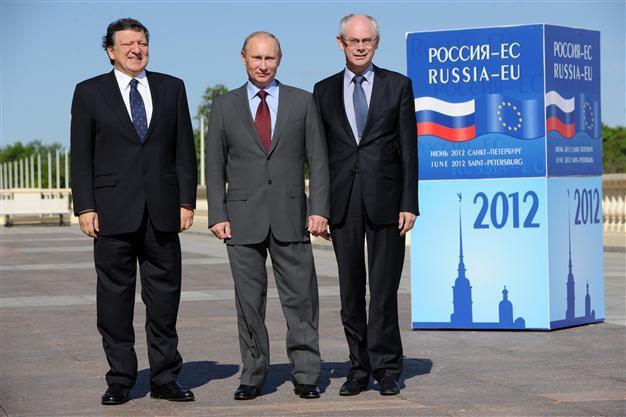EU to pressure Russia on Syria at summit
SAINT PETERSBURG - Agence France-Presse

Russia's President Vladimir Putin (C), European Commission (EC) President Jose Manuel Barroso (L) and European Council President Herman Van Rompuy (R) take part in a Russia-EU summit in Strelna, outside Saint-Petersburg, on June 4, 2012. AFP photo
EU leaders on Monday were set to pressure Russian President Vladimir Putin to harden his line against Syrian President Bashar al-Assad's regime despite little sign of flexibility from Moscow.
International frustration with the Kremlin's stance on Syria is growing again after Russia refused to squarely blame Assad for the horrific massacre of more than 100 people in Houla last month, instead saying rebels shared some of the responsibility.
But Putin stuck firmly to his refusal to back further action against Soviet-era ally Syria during a Friday swing through Berlin and Paris, and the foreign ministry signalled clearly Sunday that it was still in no mood to compromise.
Putin on Sunday evening met EU President Herman Van Rompuy and the President of the European Commission, Jose Manuel Barroso, for an informal dinner at the start of the summit in the former imperial capital of Saint Petersburg.
Official talks at the 29th Russia-EU summit began Monday at the Konstantinovsky Palace in the suburbs of the city, and the three leaders were due to hold a news conference later in the afternoon.
Putin made no mention of Syria in opening remarks before talks started behind closed doors. But his frosty tone hardly showed he was going to give his visitors an easy ride.
He testily brought up Russia's long-standing calls for the lifting of visa requirements for its citizens entering the EU.
"True partnership is impossible while there exist visa barriers for citizens of our countries," he said in televised comments.
Putin complained that Russian reporters following him in Europe had been given visas for just one day and then risked breaking the local law by overstaying their visas when his trip overran.
"And the visa was running out just as our press conference started. And what were they supposed to do: get up and leave?" he asked his guests.
The foreign ministry said on Sunday that the only way out of the Syria crisis involved a cessation of violence and support for the peace plan of UN-Arab League mediator Kofi Annan.
"Russia will continue supporting this position and calls on other states to do the same," it said.
Pressure on Russia to concede that no peace talks are emerging and to promote a Syrian compromise in which Assad cedes power to his inner circle has been building on an almost daily basis.
Secretary of State Hillary Clinton said Sunday that she "made it very clear" to Foreign Minister Sergei Lavrov in a phone call at the weekend that the focus was shifting to a political transition in Syria rather than talks with Assad's regime.
"Assad's departure does not have to be a precondition but it should be an outcome, so the people of Syria have a chance to express themselves," Clinton told reporters during a visit to Stockholm.
Also looming large is the crisis over the Iranian nuclear drive, with Russia urging the West that the standoff can only be solved diplomatically even though the United States has never ruled out military action against Iran.
Amid a new flurry of activity, Russia is preparing to host the latest round of talks on June 18 and 19 between world powers and Iranian negotiators. Putin will meet his Iranian counterpart Mahmoud Ahmadinejad on the sidelines of a summit in Beijing this week, the Kremlin announced Sunday.
The Kremlin has criticised the European Union sharply for imposing an oil embargo on Iran over its nuclear programme and argued that unilateral sanctions only diminish the chances of compromise from Tehran.
The EU and Russia are also set to discuss areas of mutual interest including energy, trade and the visa issue during the talks.
